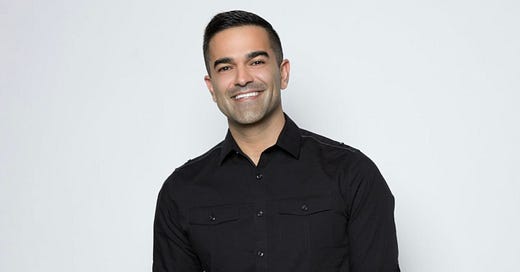Based in Los Angeles, Mikey Tanha is the CEO and Co-Founder of Noble 33, a hospitality firm dedicated to driving the hospitality industry towards sustainability. Currently, Noble 33 oversees the operations of Toca Madera, Casa Madera, Madera at the Treehouse, and Hotel Figueroa, all of which offer a modern take on cuisine while keeping the sustainably of sourcing, serving, and storing food at the forefront.
Following more than a decade in the financial sector, Mikey joined restaurateur Tosh Berman in building and expanding The Madera Group and Tocaya Organica in 2018. I caught up with Mikey to discuss the recent merger with Tender Greens, his approach to growth, and managing menu size relative to demand.
Tell us about the recent merger with Tender Greens?
For my business partner Tosh Berman and I, we had grown Tocaya to 18 locations, and we felt that merging with another well-established fast-casual brand would be an ideal way to pour fuel on the growth fire. With Tender Greens, the new merged company One Table Brands now has 45 units and a very effective combined corporate and management team. We are very bullish on what One Table Brands can accomplish moving forward as it scales both the Tocaya and Tender Greens brands under one roof.
Following the merger, you co-founded Noble33. What was the strategy behind its formation?
For Tosh and me, traveling and dining with friends have created the best memories for us throughout the years, and it’s what we love to do the most. That is why we are so passionate about the high-energy fine-dining side of the hospitality business. Our goal is to create amazing social dining venues such as Toca Madera, Casa Madera, and Sparrow in cities that we love, and provide our guests with the perfect setting where they can “dine with friends” and create lifelong memories.
Can you talk about what your approach is to growth and how you make decisions about where and when to open new restaurants?
The expansion of Noble 33 venues will be much different than the expansion of our fast casual concept Tocaya. Looking forward, our goal is to only expand into cities where our team loves spending time and where we have a built-in network. Noble 33 is just as much a lifestyle company for us as it is a restaurant/hospitality company. Therefore, we are excited about our short term expansion to cities such as West Hollywood, Las Vegas, London, New York, and Miami. In each city, we will look to open multiple concepts, which allows us to get economic scale with our team, and we will space out our openings to allow ample time for development and effective openings.
How difficult is it to go from 2 units to 5+?
It all comes down to having a solid team and making sure your processes are in place. Once you have 1-2 units operating effectively, and you have your team in place, scaling is easy. Where a lot of groups end up failing is when they try to scale too fast before all their processes are in order. We definitely went through some trials and tribulations when we were scaling Tocaya and learned a great deal from that experience.
You’ve been expanding internationally beginning in London with others slated to open in Toronto and Dubai. Will your international expansions be more aggressive than the number of locations you are adding stateside?
I don’t think that international expansion will be any more aggressive than our expansion domestically. If there is a city in which we love spending time, such as London, and we believe that we can be successful there, then we will look to plant a flag. There are definitely other international cities that I love and may be candidates for Noble 33 projects in the future.
Restaurateurs often struggle with menu management: when to add new items, which items to add, managing the size of the menu relative to consumer demand, and operational complexity. Can you talk about your approach?
We are always doing R&D. Not only do we do R&D and learn about new ideas constantly when we travel, but our team is regularly doing R&D in our restaurants.
Our approach with our menus is to appeal to widest demographic as possible. What I mean by that is we aim to create menus where everyone feels represented. So many people now have discerning food characteristics (vegan, vegetarian, pescatarian, gluten free, organic, religious beliefs, etc), that if you don’t try to appeal to these needs, you will loose a large part of your potential customer base.
Further, we create items that we believe will sell, rather than unique or fancy items. Too often, chefs will try to get fancy and create dishes that only a small part of the population will love, and that can backfire. We want our guests to look at our menu and not be able to decide what to order because everything on the menu looks good.
You can learn more about Noble 33 here.




